- Home
- Tricia N. Goyer
Whisper of Freedom
Whisper of Freedom Read online
Contents
Chapter One
Chapter Two
Chapter Three
Chapter Four
Chapter Five
Chapter Six
Chapter Seven
Chapter Eight
Chapter Nine
Chapter Ten
Chapter Eleven
Chapter Twelve
Chapter Thirteen
Chapter Fourteen
Chapter Fifteen
Chapter Sixteen
Chapter Seventeen
Chapter Eighteen
Chapter Nineteen
Chapter Twenty
Chapter Twenty One
Chapter Twenty Two
Chapter Twenty Three
Chapter Twenty Four
Chapter Twenty Five
Chapter Twenty Six
Chapter Twenty Seven
Chapter Twenty Eight
Chapter Twenty Nine
Chapter Thirty
Chapter Thirty One
Chapter Thirty Two
Chapter Thirty Three
Chapter Thirty Four
Chapter Thirty Five
Chapter Thirty Six
Chapter Thirty Seven
Chapter Thirty Eight
Chapter Thirty Nine
Chapter Fourty
Chapter Fourty One
A Whisper of Freedom
©2008 by
TRICIA GOYER
All rights reserved. No part of this book may be reproduced in any form without permission in writing from the publisher, except in the case of brief quotations embodied in critical articles or reviews.
All Scripture quotations are taken from the King James Version.
Published in association with the Books & Such Literary Agency, 52 Mission Circle, Suite 122, PMB 170, Santa Rosa, CA 95409-5370, www.booksandsuch.biz.
Cover Design: David Carlson, Gearbox (www.studiogearbox.com)
Cover Images: Bettman/Corbis, Image 100, PhotoAlto
Interior Design: Ragont Design
Editor: LB Norton
Library of Congress Cataloging-in-Publication Data
Goyer, Tricia.
A whisper of freedom / By Tricia Goyer.
p. cm.— (Chronicles of the Spanish Civil War; bk. 3)
ISBN 978-0-8024-6769-0
1. Spain—History—Civil War, 1936-1939—Fiction. 2. Americans—Spain—Fiction. I. Title.
PS3607.O94W47 2008
813'.6—dc22
2007041725
ISBN: 0-8024-6769-5
ISBN-13:978-0-8024-6769-0
We hope you enjoy this book from Moody Publishers. Our goal is to provide high-quality, thought-provoking books and products that connect truth to your real needs and challenges. For more information on other books and products written and produced from a biblical perspective, go to www.moodypublishers.com or write to:
Moody Publishers
820 N. LaSalle Boulevard
Chicago, IL 60610
1 3 5 7 9 10 8 6 4 2
Printed in the United States of America
To Moody Publishers
You believed in me. I am forever thankful for that.
Thank you for allowing me to share these stories of my heart.
Dear Reader,
A few years ago when I was researching for my fourth World War II novel, I came across a unique autobiography. One B-17 crew member I read about claimed to have made it out of German-occupied Belgium after a plane crash due, in part, to the skills he picked up as a veteran of the Spanish Civil War. Reading that bit of information, I had to scratch my head. First of all, I had never heard of the war. And second, what was an American doing fighting in Spain in the late 1930s? Before I knew it, I uncovered a fascinating time in history—one that I soon discovered many people know little about. This is what I learned:
Nazi tanks rolled across the hillsides and German bombers roared overhead, dropping bombs on helpless citizens. Italian troops fought alongside the Germans, and their opponents attempted to stand strong—Americans, British, Irishmen, and others—in unison with other volunteers from many countries. And their battleground? The beautiful Spanish countryside.
From July 17, 1936 to April 1, 1939, well before America was involved in World War II, another battle was fought on the hillsides of Spain. On one side were Spanish Republicans, joined by the Soviet Union and the International Brigade—men and women from all over the world who volunteered to fight Fascism. Opposing them were Franco and his Fascist military leaders, supported with troops, machinery, and weapons from Hitler and Mussolini. The Spanish Civil War, considered the "training ground" for the war to come, boasted of thousands of American volunteers who joined to fight on the Republican side, half of whom never returned home.
Unlike World War II, there was no clear line between right and wrong, good and evil. Both sides committed atrocities. Both sides had deep convictions they felt were worth fighting and dying for.
So on one side we have: the new democratic Spanish government, Communists, Socialists, the "Popular Front," anarchists; freethinkers, artists, musicians; peasants, workers, unions; the Republicans, the International Brigade, Thaelmann Battalion (German Communists), La Marsellaise (French-British battalion), "the people," the Basques of northern Spain, Basque president Aguirre, "the Reds," Fernando Valera, Steve Nelson. The Soviet Union backed the Republicans. A number of volunteers made their way to Spain to fight under the Republican banner, including the English-speaking Abraham Lincoln Brigade from the United States.
On the other: General Franco, General Mola, the Nationalist Rebels, Fascists, Hitler's Nazi forces, Mussolini's Italian troops, the Spanish military, Moroccan cavalry, the established Catholic Church, the monarchy, "right-wingers," wealthy landowners and businessmen. Fascist Germany and Italy supported Franco.
During the Spanish Civil War, terror tactics against civilians were common. And while history books discuss the estimated one million people who lost their lives during the conflict, we must not forget that each of those who fought, who died, had their own tales. From visitors to Spain who found themselves caught in the conflict to the Communist supporters. Basque priests and Nazi airmen . . . each saw this war in a different light. These are their stories.
Tricia Goyer
Summaries
SUMMARY FOR BOOK #1:
A VALLEY OF BETRAYAL
A Valley of Betrayal tells the story of Sophie, a young woman who is filled with romantic notions and dreams of walking down the aisle in a blue wedding dress and living happily ever after with her fiancé, Michael. In July 1936, Sophie reaches the border of Spain as civil war erupts.
With the border closed, Sophie must rely on the generosity of a mysterious stranger, Walt Block, to get her into Spain. Her reunion with Michael is bittersweet and he urges her to leave the country for her safety. While Sophie wonders if Michael's passion for her has cooled, she finds herself in love with the Spanish people. Yet even though she understands more about Spain, she questions all she once knew about Michael—especially concerning his relationship with the beautiful Maria Donita.
Spain is divided between two major political regimes. The Nazis are exerting their influence, supporting strong-arming Fascism led by General Franco. At the same time, Russia is enticing the ordinary, Spanish people with the idealistic vision of Communism. What was once a thriving paradise has become a battleground for fascist soldiers fighting against Communist-supported Spanish patriots.
The brutal realities of war provide a rude awakening, and Sophie uses her art as therapy for the children of the city, teaching them to express their visions and fears of the war through painting. Sophie also begins to paint pictures of war-torn Spain in order to alert the world to what is happ
ening.
Michael is shot and killed by a sniper's bullet, and after she discovers Maria Donita is pregnant with Michael's child, Sophie agrees to be escorted out of the country by Michael's friend José. A wrong turn and a sniper's bullet nearly kill José, too. This causes Sophie to seek the help of a stranger—an International Volunteer and fellow-American named Philip. Now on the front lines of the battle, Sophie finds purpose in nursing the wounded and in painting the war's events and people in order to support the patriots' cause.
Philip Stanford had also journeyed to Spain for reasons having nothing to do with the war. Philip is an athletic trainer for his friend Attis Brody, who plans on running in the Workers' Games. Refusing to run in the Olympics in Berlin for political reasons, they are disappointed that the Workers' Games are called off because of the conflict. Instead of returning home, Philip and Attis put aside their track shoes and pick up rifles for the Spanish Communist cause. Philip and Attis start out in Barcelona, but end up in the trenches of the Spanish countryside fighting as members of the Internationals—volunteer soldiers from many different countries. Attis is killed in battle, but Philip chooses to continue his fight.
One day, in a forest marked by enemy artillery, a woman appears like a vision. Philip rescues Sophie and becomes her guardian. They build a friendship. Just when their care for each other seems to be blossoming into something more, they are pulled apart when Philip is accused of providing aid to an enemy flyer. Philip survives imprisonment and later finds Sophie in the bombed town of Guernica where she has gone to find out the truth about Michael's death.
In Germany, pilot Ritter Agler—a family friend of General Goering—joins the secret German Luftwaffe. A Nazi pilot, Ritter fights for glory and the favor of his girlfriend in Berlin, shooting Russians out of the sky and bombing the cities and villages of Spain.
Shot down on a mission, Ritter finds himself in Communist-controlled Spain. In an effort to save his life, Ritter poses as a German volunteer who has been injured fighting for the Communist cause. In the hospital, he is befriended by a beautiful American nurse and painter. Though Ritter tries not to care, his heart is stirred by Sophie. When Ritter is finally mobile again, he steals a plane and escapes back to his airbase. Once there he takes part in the bombing of Guernica.
After being raised under segregation, a young black man named Deion Clay decides he cannot sit back and do nothing about the civil war in Spain. Deion hops a train to New York and joins the Communist party. With Communist support, he sails to Europe and hikes over the Pyrenees into Spain, entering the fight against the Fascist oppression. He finally feels part of something greater until an injury takes him away from the front lines. Deion ends up as a driver for the American painter, Sophie, and their last destination is the worst experience of the war. They arrive near the outskirts of Guernica in time to see the horrific bombing of the village by German aircraft.
Father Manuel Garcia ministers to a congregation in the Basque countryside, yet he is troubled by the complacency of the people—both toward the war and their Lord. When war comes to Guernica, Father Manuel feels hopeless. So many are lost . . . and without his people to serve, Father Manuel wonders what plan God has for him next.
The book ends with the bombing of Guernica. Although Sophie, Philip, Father Manuel, and Deion have survived much, they question their next moves. Is it possible that ordinary men and women can make a difference in a war that seems impossible to win?
SUMMARY FOR BOOK #2:
A SHADOW OF TREASON
After witnessing the bombing of Guernica, Deion helps to rescue survivors from under the rubble of the buildings. Seeing the destruction confirms that his duty is to fight for Spain's freedom before many more innocent people are lost.
Sophie discovers that nothing is as she first imagined. When Walt, the reporter who helped her over the border, shows up again after Guernica is bombed, Sophie is given an impossible mission. Walt tells Sophie a tale of priceless Aztec and Inca gold stolen from bank vaults in Madrid. If found, this gold could pay for weapons to help the Republicans' fight against the Fascist Nationalists. The only person who knows where the gold is hidden is Sophie's ex-fiancé, Michael, who she discovers had not been killed after all.
Walt confesses that his job for the past two years has been to track Michael and his associates, knowing they have their own plan for the gold that has nothing to do with saving Spain.
Petra is a young girl raised in a wealthy family. After the bombing of Guernica, Petra has no one left. She dresses as a poor girl and hides away in a truck leaving Guernica. Her plan is to travel to Bilbao in order to find her friend Edelberto—the one person she has left. Yet when she arrives at his parents' estate, she discovers he has escaped to France with his family. With nowhere to go, ranch hands Pepito and Juan—and Juan's son José—take pity on her and care for her. They all build unlikely friendships.
To save Spain, Sophie must reinstate herself in Michael's life and find out his secrets. To do this she must leave behind Philip, the man she's fallen in love with, and return to the man who betrayed her. Sophie knows that she must hide her heartache over Michael's betrayal in order to get information about the gold. Whatever happens, she cannot let Michael realize she knows the truth about Maria Donita's child or about Michael's part in stealing the gold.
Walt also works behind the scenes to bring Father Manuel to Paris so the world can hear the truth about the German bombing of Guernica. Once in Paris, Father Manuel is befriended by a young Spanish man named Berto who helps Father Manuel find a place to stay and introduces the priest to Picasso. Picasso is eager to hear about the bombing of Guernica since he is painting this event for inclusion in the World's Fair being held in Paris.
Sophie connects again with Michael and attempts to find the information Walt needs. With each new day, Sophie discovers more layers to this international espionage scheme. She is determined to find the information that could turn the tide of the war and help protect the soldiers in the International Brigade, including Philip and Deion.
When Sophie discovers photographs that she believes are clues to the gold's hiding place, she must get this critical piece of information to Walt in time. As she ventures out to meet up with her contact, Sophie is caught. Thankfully, she is saved by the guardian sent to watch over her.
With the help of an old friend, José, Sophie is able to send Walt the information he needs. Then, with the front lines moving closer, Sophie escapes to Madrid with Michael. She only hopes that Walt can get to the gold before Michael does.
Asked to return to Germany, Nazi pilot Ritter Agler is given a new assignment—to travel to the United States and steal the plans for a very important bombsite that could help the Germans. Since Ritter hid himself so well among the Americans the first time, Goering believes he is the perfect spy for the job. Ritter travels to the United States and completes his mission.
Philip returns to the front lines with the International Brigades. Throughout the many battles, he prays to make it out safe so he can be reunited with Sophie again. After one battle, Philip is given leave and he travels to Madrid. He is shocked when he sees Sophie at the train station on the arm of Michael, her fiancé, who he thought to be dead.
Walt has kept his eye on the numerous players in this international espionage game for many months. Thanks to Sophie, he now knows where the gold is hidden. The question is if he can reach the treasure before Michael. Walt travels to southern Spain where the fascists are hard at work trying to build a tunnel to connect Gibraltar with Africa. Walt knows that the gold is hidden in the tunnel and he uses his acting skills to get him inside.
Once inside, Walt discovers the gold, Michael, and Sophie. An explosion leaves Michael injured, and when Walt prepares to rescue Sophie and the gold, Michael begs to come. At the airfield, it looks as if Michael once again overcomes the odds and flies away with the stolen gold. But after the cargo plane flies away, Sophie discovers that the soldiers at the airfield are on Walt's payroll. Not
only is the gold saved, Sophie is reunited with Philip, whom Michael had taken as prisoner.
Now Walt, Sophie, and Philip are together. They have the gold. The question is . . . can they get out of Spain in order to help those who need it most?
Characters
Sophie Grace, twenty-five, American, aspiring artist, in Spain to join her fiancé
Walt Block, American newspaper correspondent who has been behind much of Sophie's adventure from the onset; a.k.a.
James Kimmel, a pro-Franco reporter
Marge and William, Walt's adoptive parents
Philip Stanford, American, soldier in volunteer Abraham Lincoln Brigade, Sophie's new love
José Guezureya, childhood friend of Michael (son of horse trainers who worked for Michael's family)
Ramona, José's wife
Juan, José's father
Pepito, fellow "ranch hand"
Michael, Sophie's ex-fiancé and reason she originally came to Spain
Walter, his father
Cesar, his bodyguard
Adolfo Vidal, Michael's uncle
Edelberto, Berto, Adolfo's son (Michael's cousin)
Father Manuel Garcia, a priest who fled Guernica, now staying in Paris with Edelberto's family
Petra Larios, orphaned daughter of wealthy family of La Mancha, has joined up with José's family
Deion Clay, African-American, also in Abraham Lincoln Brigade
Gwen, a nurse with whom he falls in love
Maria Donita, young Spanish woman whom Sophie once felt was a threat to her relationship with Michael, now married and with a child
Carlito, her son
Ritter Agler, pilot in German air force, a.ka.
Hermann von Bachman
Isanna, the woman he wanted to marry
Xavier, the man Isanna married
Sebastian, son of Isanna and Xavier

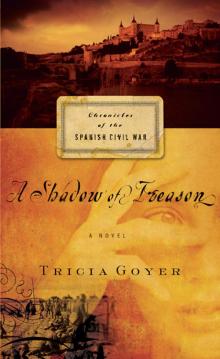 Shadow of Treason
Shadow of Treason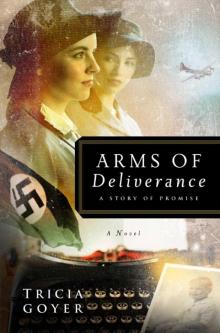 Arms of Deliverance
Arms of Deliverance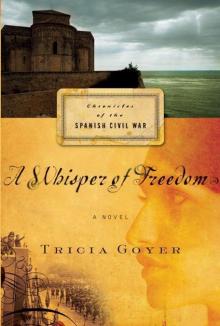 Whisper of Freedom
Whisper of Freedom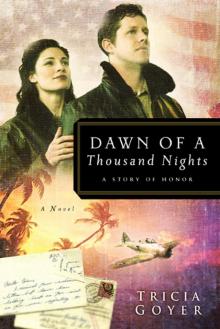 Dawn of a Thousand Nights
Dawn of a Thousand Nights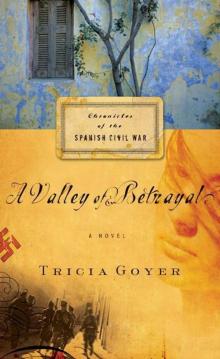 Valley of Betrayal
Valley of Betrayal